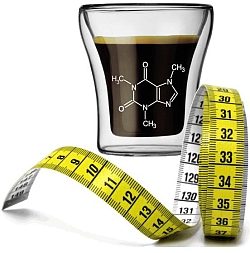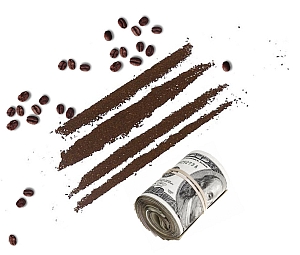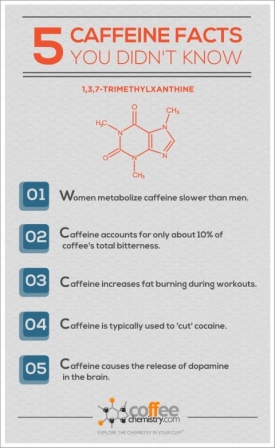
1. Women metabolize caffeine slower than men
Under normal conditions, caffeine has an average half-life of ~6 hours. Great, but what does this actually mean?
Well, say you have a cup of coffee containing 100mg of caffeine at noon (12PM), then by 6PM that same day your body would have eliminated half of its initial concentration or 50mg. By midnight you would be down to 25mg, then 12.5mg and so on until you've completely eliminated caffeine from your system.
Okay, but how does gender affect this? According to studies, given the same concentration of caffeine, women on average retain 3-4x the concentration of caffeine in their bodies than males for the same 24 hr period.
Why you ask? Well there are number of factors that the rate at which caffeine is metabolized. Factors including age, weight, whether you're a smoker or non-smoker, etc all have an effect. So it's very likely that caffeine may have a a greater (and longer) stimulatory impact on females than males.

2. Caffeine accounts for only about 10% of coffee’s total bitterness
When we think of coffee most people immediately think of caffeine and since caffeine is an alkaloid with an intensely bitter taste, the idea that caffeine is responsible for coffee’s bitterness is common. But contrary to popular belief, it’s been estimated that caffeine only accounts for 10-15% of coffee’s total bitterness. It turns out that much of coffee’s bitterness comes from the formation of secondary compounds created during the roasting process and not from the caffeine itself.

3. Caffeine increases fat burning during workouts
Hitting that corner Starbucks before working out?
According to researchers, having a cup of coffee before workouts may actually help you ‘burn fat’ by triggering cells to release free fatty acids into your bloodstream. Once released, these fatty acids are readily available as an ample source of ‘fuel’. In addition, caffeine increases physical performance so not only will your workouts allow you to push harder, but more effectively as well.

4. Caffeine is typically used to ‘cut’ cocaine
Perhaps the single most important element in running any successful business is the ability to cut expenses in an effort to maximize profits: the drug business is no different.
With increased competitions from local dealers the drug trade has forced many dealers to ‘cut’ or otherwise adulterate their cocaine supply with fillers including: talcum powder, mannitol (sugar alcohol), boric acid (roach insecticide), benzocaine (oral anesthetic), paracetamol (Tylenol) and dozens other adulterants.
With the widespread availability of powdered caffeine available over the internet, dealers have recently focused on using this ubiquitous powder to bulk up their supply of cocaine. According to a 2008 BBC Customs report on 214 seized cocaine samples, approximately one out of every four cocaine lots were adulterated with caffeine.

5. Caffeine causes the release of dopamine in the brain
For millions of people the start of a new day begins with none other than a hot cup of coffee. Some would even say that without their coffee their ability to interact with others would be limited without their fix.
David Letterman has even quoted as saying that “if it weren't for the coffee, I’d have no identifiable personality whatsoever.”
But is there any truth to this?
According to researchers, drinking coffee may have psychological effects on human’s cognitive ability by facilitating the release of the dopamine in the brain.
But unlike cocaine or amphetamines which cause a surge of dopamine to be released from the nucleus accumbens (the primary pleasure center of the brain) - the caffeine in coffee acts on the pre-frontal cortex involved in cognitive behavior, complex planning, decision making and overall personality expression. So drinking coffee may actually facilitate better thought processes for people.
So the next time you have an important meeting to attend, you may want to wait until everyone has had their morning cup of coffee.


